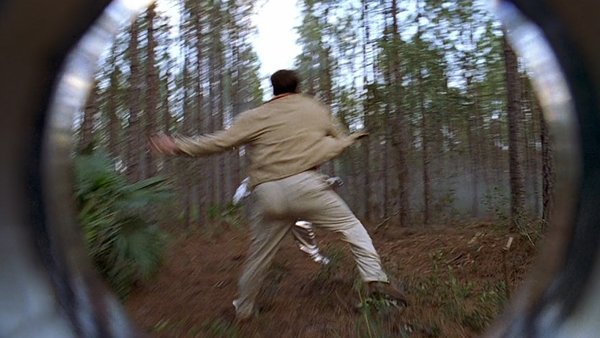Why You Will Never Watch The Truman Show The Same Way Again
The Truman Show Foreshadowed More Than Just Reality Television

Truman’s quest for truth is influenced initially by seemingly insignificant ‘accidents’ that happen around him. A studio light falls from the sky and smashes to the ground near Truman and a shower of rain falls only on him as he runs in and out of it. At this point, he’s never had a reason to question his reality and therefore finds these things weird and comical; certainly not questionable, but perhaps anomalies in his real world, unaware of their significance.
Everything takes a turn for Truman when he sees a homeless man on the street who turns out to be the same actor who played his father. Having ‘lost’ his father in a boating accident as a child, Truman is perplexed at his presence in the street before he is quickly ushered onto a bus by ‘pedestrians’. This is the moment that gives momentum to Truman’s questioning of his reality as his own family tells him he is mistaken and newspapers suddenly have headlines pertaining to the town cleaning up the homeless from the street.
In essence, Truman is battling against the “fake news” everyone is telling him to believe versus what he is beginning to understand for himself. Christof and his team orchestrating how Truman's life unfolds to achieve high viewer engagement is also reflective of our digital media landscape. These concerns aren’t new, and were very much a fixture of the political context The Truman Show released into in 1998. However, they have been augmented with the advent of social media, with news organisations and “content creators'' chasing greater engagement via search engines and social media with the rise of Google and sites like Facebook, Twitter, and Instagram, which reward sensationalist, inaccurate reporting, as well as shock-value content.
Authenticity in the digital era can be difficult to come by, and Truman’s engagement-hungry director is a prescient example of the algorithmic cycles driven by search engines and social media.
In a world of superficiality, Truman experiences authenticity in his feelings for Sylvia before she is quickly removed from his life. She openly tells him that she's not supposed to talk to him, before whisking him off to the beach in an attempt to reveal the truth. Truman’s passion to travel to Fiji is fuelled by his feelings for Sylvia, a truth and reality in his feelings that cannot be controlled or taken away from him. Truman hides (or believes he is hiding) a collection of images torn out of magazines and placed together as a jigsaw to replicate her face - a true message to Christof and the production team that you can remove the things Truman loves and shows interest in, but his feelings cannot be controlled.
In the current era of curated online personas and social media-applied filters, Truman highlights the importance of staying true to yourself in a contemporary world that so often promotes a distorted version of reality.